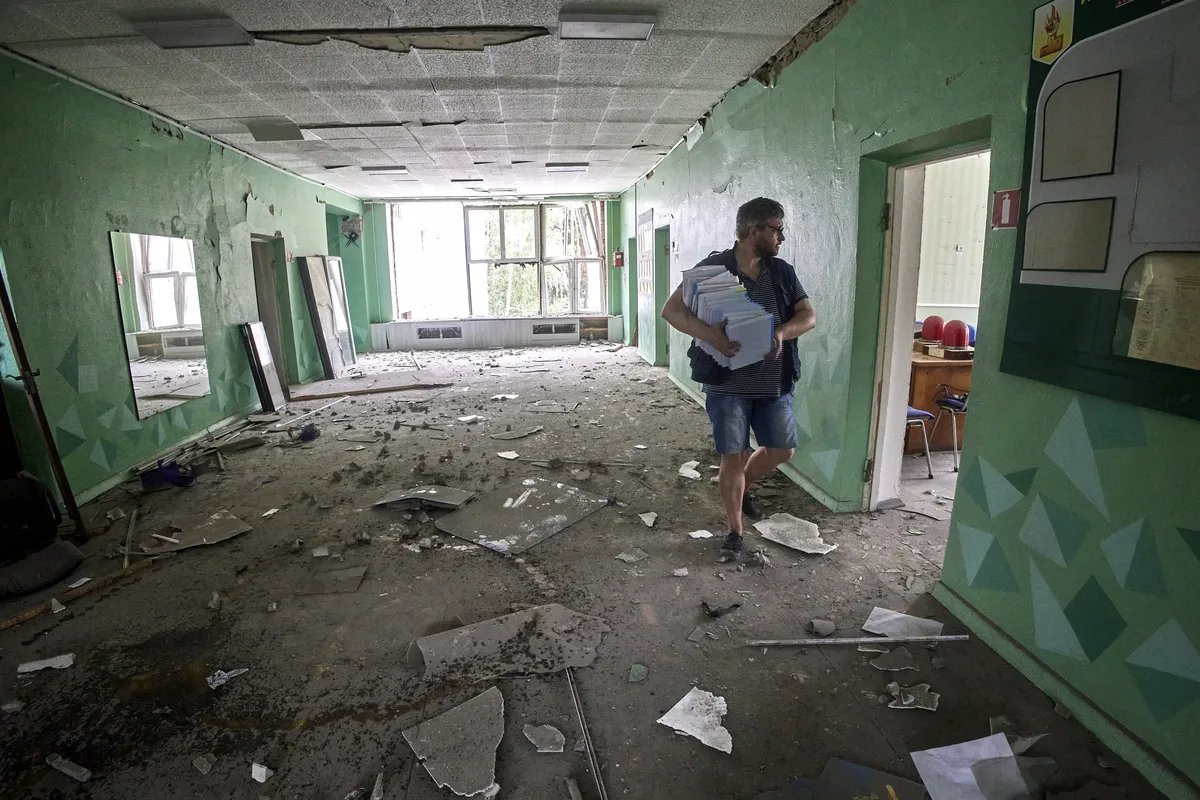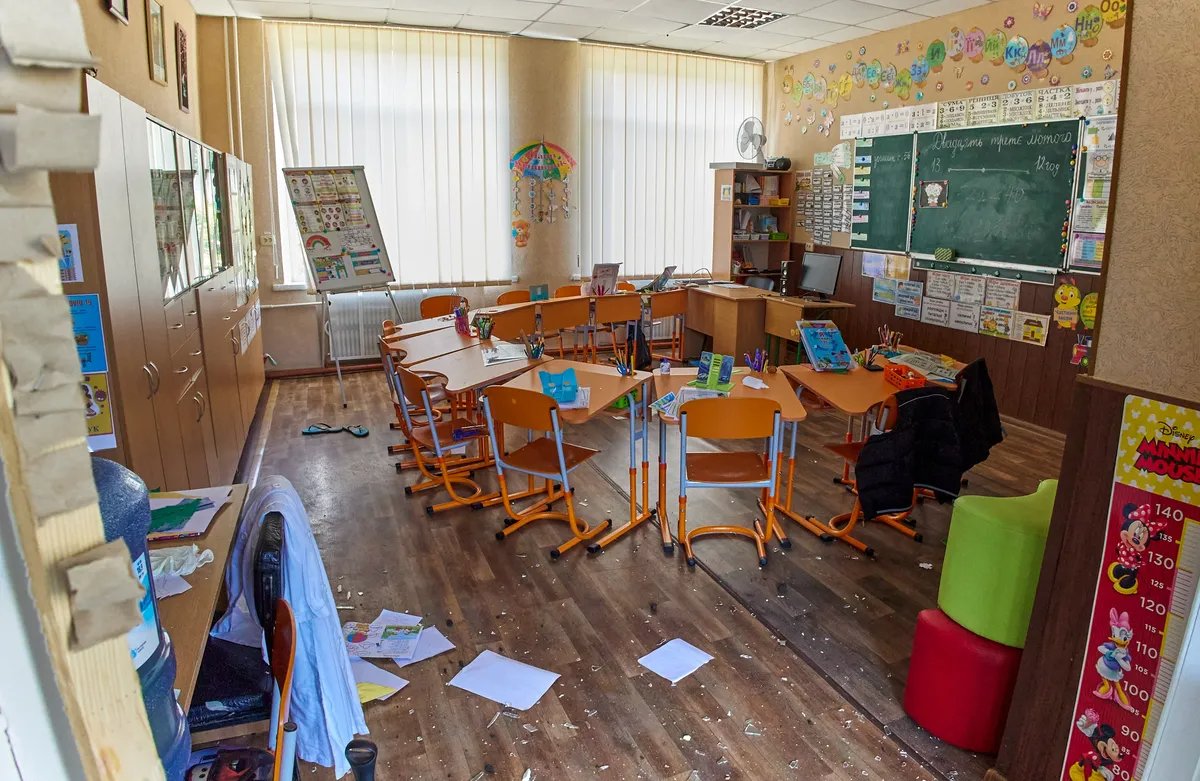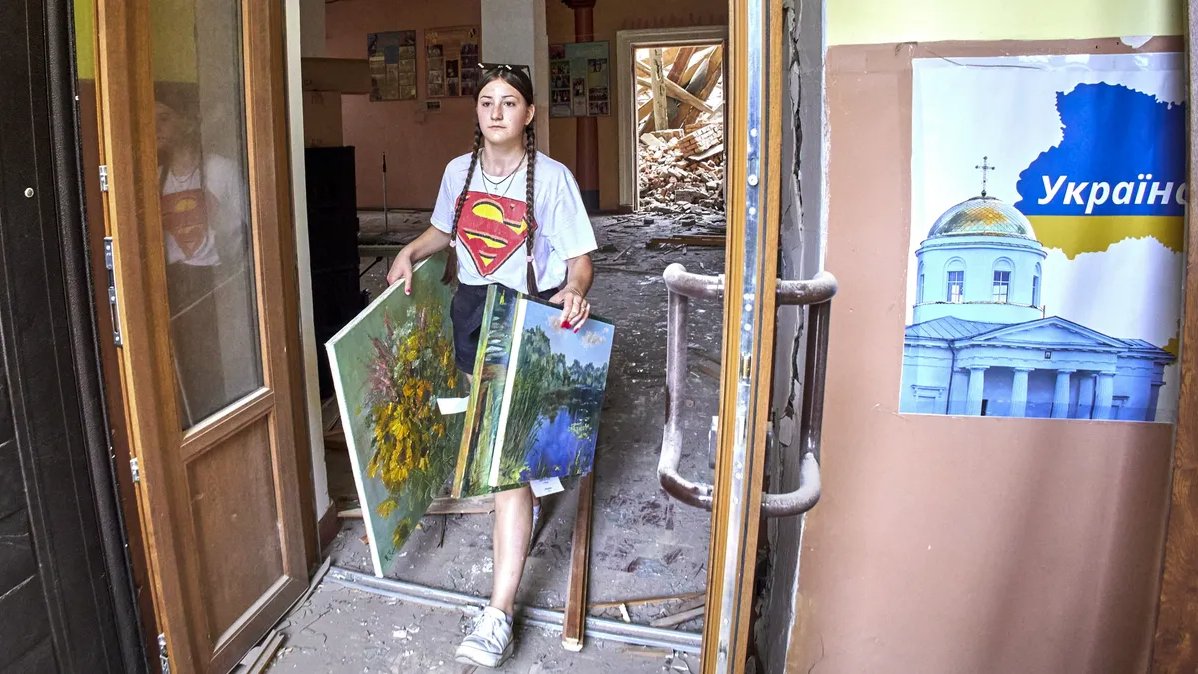The Russia-occupied territories of Ukraine are preparing for the new school year. Russia has already banned teaching the Ukrainian language and history and brought its own textbooks and teachers. Some local teachers have left the occupied territories, some are being retrained and are getting ready to work in classrooms using Russia’s syllabus. Others are planning on using Ukraine’s syllabus and teaching online.
The Russian syllabus
Russia’s Integrated Educational Space programme has been promoted by the authorities in recent years and, in simpler terms, means unified textbooks and the unified syllabus for all Russian schools. This programme is now being introduced to students and teachers in the occupied regions of Ukraine. Russia’s Education Ministry announced this after signing an agreement with the so-called “DPR” and “LPR”, the pro-Russian breakaway states in east Ukraine. “Russia’s educational standards have been introduced in the historic regions pretty well already. As for the liberated territories, the process of switching to Russia’s standard is ongoing; we have made all necessary decisions for this. We are also working on providing the teachers with all necessary training and textbooks,” said Sergey Kravtsov, the Education Minister, in his solemn speech upon signing the agreement.
The Education Ministry introduced its programme on “retraining teachers from the DPR, LPR, and the liberated territories” on 14 June. The programme is aiming to provide training to 15,000 teachers; approximately 5,500 of them have already completed the course.
Kravtsov also mentioned that the schools in question will have staff responsible for “awareness-raising”, or, simply put, promoting Russia’s ideology. Such workers were introduced in 10 Russia’s regions last year as part of the pilot project, but, starting from 1 September, a total of 34 regions will have them, including the occupied territories of Ukraine. Obviously, the schools will have to face the new mandatory ceremony introduced recently: raising Russia’s flag to the strains of the country’s national anthem each Monday morning.
The retraining course includes introducing Russia’s syllabus, information on the state exams, and, again, “awareness-raising work”, i.e., the ideology these teachers are expected to deliver to their students. Russia-controlled educational bodies are already setting up “methodology seminars” where Russia’s history and “patriotic mentoring” are introduced as priorities in teaching.
There will also be special focus upon the “denazification” of students. Sergey Kravtsov says there should be no more Ukraine’s “nazi propaganda” in textbooks:
“Local students have been using Ukrainian textbooks until recently; these textbooks were full of nazi ideology and hatred against Russia. We have analysed over 300 Ukrainian textbooks and concluded that this was their general tactic. It is going to be challenging for us to change the student’s minds, but we’ll be working towards that.”
Ukrainian schools are integrated into Russia’s educational system not only in the “DPR” and “LPR”, but also in the regions of Kherson and Zaporizhzhia, which Russia’s rhetoric calls “the liberated territories.” These territories, however, still lack any formal relation to Russia whatsoever; the “referendums” planned for autumn are still yet to happen.

A man carrying a pile of books in a school which suffered shelling, Chuhuiv, Kharkiv region, Ukraine, 25 July 2022. Photo by Sergey Kozlov / epa.eu
Certificates for school leavers, summer camps for children
Sergey Kravtsov recently handed out Russian graduation certificates in a school in Kherson which received Russia’s accreditation first. Ukrainian sources report that the school’s headmaster, Elena Gertskhali, was kidnapped by armed people who then kept her in a basement and forced her to record a video in support of the Russian educational programme. “Yes, I do support switching to Russia’s syllabus, because this is the present-day reality,” she later told as she spoke to RIA Novosti, a Russian news agency.
Russia’s educational authorities have announced that anyone from the Kherson region who is willing to receive a Russian graduation certificate should pick it up from the aforementioned school. A total of 70 graduates have done this so far.
Over 20,000 templates for Russian graduation certificates have been brought to the Zaporizhzhia region, in addition to Russian textbooks. The first delivery was made by Sergey Kravtsov himself as he arrived in Melitopol in early July. He said that the new books ‘contain no aggression, instead, the values of inter-ethnic friendship’ are being promoted there.”
Schools in the region of Kharkiv have also received Russia’s accreditation.
Children from the occupied territories are to spend their summer holidays in Crimea. For instance, the occupying administration in Berdiansk offers children free tours to Artek, a famous summer camp in Gurzuf.
All the parents need is to bring their child’s passport or birth certificate and get the voucher. A group of 60 schoolchildren from Kherson have become cadets at the Nakhimov Naval School Sevastopol; Ukraine says this is how Russia is trying to “militarise” Ukrainian children.
It is fair to say that these concerns are not baseless: Russia’s Young Army, a youth military organisation sponsored by the Defence Ministry, has been present in the regions of Luhansk and Donetsk for several years.
Children from the so-called “DPR” and “LPR” spend their holidays in Russia’s summer camps and “educational centres”. Some of them were even brought to Chechnya where they had a tour around the city of Grozny which had been rebuilt after the Chechen Wars, and met Ramzan Kadyrov in person.
Empty schools
Many teachers and students left their schools before the 21/22 academic year came to an end; schools in combat areas switched to online classes. For instance, the Kherson region lost half of its population by late May;
and its residents keep leaving. Iryna Vereshchuk, Ukraine’s Minister of Reintegration of Temporarily Occupied Territories, insists on full evacuation of civilians in the regions of Zaporizhzhia, Kherson, and Donetsk.
Russia’s Education Ministry says a total of 1120 schools will open their doors to students on 1 September in the occupied areas. Those are called “base schools”, meaning they will provide classroom learning. Other schools will remain closed and will be “attached” to the “base” ones.
Tatyana Kuzmich, head of the Department for Education at Kherson’s occupation administration, says “this decision was made due to the fact that there are fewer students and teachers in general.” She also added that “the Kyiv regime is trying to undermine the educational process.” Ukraine’s media refer to Kuzmich as “collaborator” and remind their readers that she was suspected of co-operating with Russia’s intelligence in 2021.
The occupation authorities are trying to convince the teachers who preferred to stay to get back to work. The promises are: huge salary and proficiency courses in Crimea’s Yevpatoria. Similar courses have also been set up in Russia’s Rostov-on-Don, Stavropol, Sochi, and Moscow region. Some teachers are being retrained in the occupied territories, too.

A classroom in a school for visually impaired children, damaged by Russia’s shelling, Kharkiv, Ukraine, 7 July 2022. Photo by Sergey Kozlov / epa.eu
Either collaborators or saboteurs
Ukraine’s teachers are finding themselves in a situation between a rock and hard place now. The Ministry of Reintegration of Temporarily Occupied Territories has told them that switching to Russia’s syllabus is considered collaborationism, a criminal offence. They are recommended to stop teaching and have their salaries paid anyway.
Kirill Stremousov, deputy head of Russia’s occupying administration in the Kherson region, has told Russia 24 that Ukraine was “paying teachers and expected them to undermine education.”
Some teachers in the Kherson region said they would rather “live off their land than betray their students” in late May. Ukraine’s media say 90% of the people employed at schools gave up their positions; the remaining 10% are “janitorial staff.” On 26 May, a group of Kherson school teachers was invited to meet Vladimir Saldo, the head of the occupation administration. They walked out immediately when they were told they would have to switch to the Russian syllabus. However, there are some teachers who still work because parents ask them not to leave the kids alone.
These teachers have agreed to undergo retraining, but now they are dubious whether they made the right decision. Here is how Vladimir Konstantinov, Crimea’s Chairman of the State Council, decribes them in his interview for TASS (note how Russia’s news agency cut his speech): “People from those territories seem to be seriously frightened. It’s easily seen, they are afraid to ask questions or talk publicly. They are afraid of their own kind, <…> and this perfectly describes what Ukraine’s authorities really are. <..>. Coming here was indeed a brave move for these people, anyway; most of the ‘elites’ there abandoned their communities, there’s no one to take care of people there. So, hopefully, decent managers will take charge now, as it’s the most important issue.”
Ukraine’s Education Ministry is planning on setting up online classes for the kids in occupied areas. Some Ukrainian school teachers write on social media that they made their choice and are ready to start teaching online for a small salary.
School leavers who refused Russia-issued graduate certificates may get Ukrainian ones, but they need to travel to a Ukraine-controlled territory, or ask their relatives to do so, using a letter of attorney. For instance, graduates from the Russia-occupied city of Berdiansk receive their certificates in Zaporizhzhia.
It is likely that some parents from the occupied areas will prefer Ukrainian online classes to Russia’s classroom ones. However, they are facing problems as well. Parents from various cities (e.g. Berdiansk, Kherson, Melitopol, Polohy) report that the occupation authorities are threatening to deprive them of parental rights should they opt to keep their children at home. Teachers receive threats, too: one of them told Suspilne Novyny what he heard from the pro-Russian authorities: “If you fear treason charges in Ukraine, you’ll face them in Russia as well if you don’t cooperate.”
And finally, teachers who agreed to work with Russia now receive threats from the local partisans.
Imported teachers
Russia’s Education Ministry faced a serious challenge filling up the newly-opened schools with teachers. The agency requested schools in Russian regions to provide them with lists of teachers who would agree to work in the occupied territories, offering them daily wages of up to 8,600 rubles (€140). This is huge money even for Russia’s wealthiest regions, and in some parts of the country such amount of money might be ten times as high as the regular teacher’s salary.
Some teachers who accepted the offer agreed to speak to media. Most of them say they made the decision voluntarily, without any pressure from the local authorities.
Both teachers and officials say they simply want to help children: kids need to get their education, and schools must be open at all times, just like hospitals. Doctors go there for work, and construction workers do too. For double wages, of course, as per decree by Russia’s PM Mikhail Mishustin. But yes, money does matter as well.
Mediazona, an independent Russian media outlet, reported of 214 teachers who agreed to move for work. Over 30% of those people are from Dagestan, a poor region in south Russia; the rest hail from small settlements all across the country. Their personal data leaked to public domain shortly afterwards, obviously due to mismanagement by the officials. The Alliance of Teachers, an independent labour union, sent this data to Ukraine’s Security Service, which outraged Alexander Hinstein, an MP, who addressed the FSB and the General Prosecutor, asking them to take appropriate measures.
To cut a long story short, teaching has become a dangerous job not only for Ukrainian teachers, but also for their Russian replacements, no matter what their motivation is: ideology, humanitarian values or simply money.
Делайте «Новую» вместе с нами!
В России введена военная цензура. Независимая журналистика под запретом. В этих условиях делать расследования из России и о России становится не просто сложнее, но и опаснее. Но мы продолжаем работу, потому что знаем, что наши читатели остаются свободными людьми. «Новая газета Европа» отчитывается только перед вами и зависит только от вас. Помогите нам оставаться антидотом от диктатуры — поддержите нас деньгами.
Нажимая кнопку «Поддержать», вы соглашаетесь с правилами обработки персональных данных.
Если вы захотите отписаться от регулярного пожертвования, напишите нам на почту: [email protected]
Если вы находитесь в России или имеете российское гражданство и собираетесь посещать страну, законы запрещают вам делать пожертвования «Новой-Европа».

